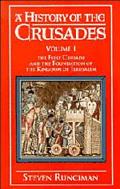

 |

|

The average rating for A History of the Crusades: The First Crusade and the Foundation of the Kingdom of Jerusalem,... based on 2 reviews is 5 stars.
Review # 1 was written on 2007-10-26 00:00:00 Joe Arnold Joe ArnoldI read a review of The Arabian Nights on GR which began - pessimistically and rather alarmingly - "I needed a book which I could lose" - the idea being either that the reviewer has a form of dementia or is in an ongoing situation where they may need to flee and have no time to grab their reading material (I can't really imagine being that frantic but some people lead less sheltered lives than me). Anyway, that reader should avoid Sir Stephen Runciman's towering, complex and riveting three volume history of the Crusades, because once you get going, you won't want to lose it. Indeed, you will be taking it with you everywhere, into the boardroom, the bathroom, into your most intimate boudoir itself. (What lives I imagine you living!) This is a vastly tangled story, what with Caliphates, Seljuks, Byzantines, Franks, Abbasids, and starring roles for Saladin, King Richard Couer de Lion, Baldwin IV the Leper King of Jerusalem (he was 15, they carried him out onto the battlefield, he was dying, but you still had to have the King on the battlefield because the King was magic, even if horribly disfigured - apparently he was a sweet boy, everyone said so), Pope Urban Renewal II, monks called Fulcher, Kerbogha, the atabeg of Mocha, Baldric of Dol, Walter Sans Avoir, and not forgetting The Assassins (a backing group). When they got there the crusaders built places such as Krak de Chevaliers. I mean, how cool is that? If you like your outrageous continent-spanning narratives big, bold and scholarly, or if you're done with A Game of Thrones, these three hefty volumes might be just what the Doctor of Medick ordered. ** On a more serious note, the wonderful complexity of the Crusades are such that they represent the first episode of unprovoked Western imperialism (before the 11th century the West wasn't in any position to colonise anyone; and the whole thing didn't last that long, the Crusader states hobbled on for about a century or so and then were absorbed back into the caliphate, which was, of course, itself an imperial enterprise); but also, the Crusades represented the first interpenetration of the West and the East, which heretofore were sealed off from each other. The meeting of the two civilisations was violent, but did not remain so. When fresh convoys of Teutonic and Frankish knights arrived in Antioch and Jerusalem, the older crusaders often sighed with regret, knowing that these new hotheads would soon be wanting to carve their way through the infidel hordes and entirely disrupt the delicate mutual respect and economic intercourse which had by then, slowly but surely, been established. And so it went. |
Review # 2 was written on 2008-12-26 00:00:00 Dennis Woods Dennis WoodsOne of the biggest favors you can do for yourself in this life is to read Steven Runciman's History of the Crusades. If you are daunted by its length, know that just reading Volume 1 will enrich your knowledge of the millenium-old struggle between Islam and the west a hundred fold. This first part takes you from the launching of the Crusades by Pope Urban II at Claremont through the bloody and merciless conquest of Jerusalem by the Crusaders that ended the First Crusade. Along the way, you will learn a great deal about medieval politics and culture, Catholic and Orthodox theology, medieval warfare, feudalilsm, the history of Islam, and any other number of things. The only thing this history lacks is much probing of medieval culture beneath the upper crust of the social stratum. You wont' learn much about the lives of women, the poor, the rural peasantry, etc....but Runciman is far more sensitive to the moral complexities of the subject than many other earlier historians. For one thing, this is not a tale of righteous Christians and barbarous, backwards Muslims. If anything, the historical facts cannot help but continually position the Crusaders as the backwards barbarians, particularly in the amusing episode of their arrival in the Orthodox Christian capital of Constantinople, where the Greeks (particularly Anna Comnena) are horrified by the boorishness of their Frankish and Norman guests. Anyway, if you are interested in the Crusades, stop watching bad Ridley Scott movies and pick this up: you won't regret it. |
CAN'T FIND WHAT YOU'RE LOOKING FOR? CLICK HERE!!!